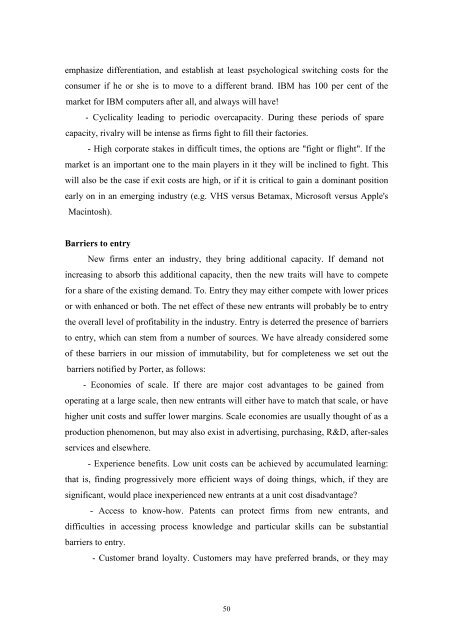DSpace at Khazar University
DSpace at Khazar University
DSpace at Khazar University
You also want an ePaper? Increase the reach of your titles
YUMPU automatically turns print PDFs into web optimized ePapers that Google loves.
emphasize differenti<strong>at</strong>ion, and establish <strong>at</strong> least psychological switching costs for the<br />
consumer if he or she is to move to a different brand. IBM has 100 per cent of the<br />
market for IBM computers after all, and always will have!<br />
- Cyclicality leading to periodic overcapacity. During these periods of spare<br />
capacity, rivalry will be intense as firms fight to fill their factories.<br />
- High corpor<strong>at</strong>e stakes in difficult times, the options are "fight or flight". If the<br />
market is an important one to the main players in it they will be inclined to fight. This<br />
will also be the case if exit costs are high, or if it is critical to gain a dominant position<br />
early on in an emerging industry (e.g. VHS versus Betamax, Microsoft versus Apple's<br />
Macintosh).<br />
Barriers to entry<br />
New firms enter an industry, they bring additional capacity. If demand not<br />
increasing to absorb this additional capacity, then the new traits will have to compete<br />
for a share of the existing demand. To. Entry they may either compete with lower prices<br />
or with enhanced or both. The net effect of these new entrants will probably be to entry<br />
the overall level of profitability in the industry. Entry is deterred the presence of barriers<br />
to entry, which can stem from a number of sources. We have already considered some<br />
of these barriers in our mission of immutability, but for completeness we set out the<br />
barriers notified by Porter, as follows:<br />
- Economies of scale. If there are major cost advantages to be gained from<br />
oper<strong>at</strong>ing <strong>at</strong> a large scale, then new entrants will either have to m<strong>at</strong>ch th<strong>at</strong> scale, or have<br />
higher unit costs and suffer lower margins. Scale economies are usually thought of as a<br />
production phenomenon, but may also exist in advertising, purchasing, R&D, after-sales<br />
services and elsewhere.<br />
- Experience benefits. Low unit costs can be achieved by accumul<strong>at</strong>ed learning:<br />
th<strong>at</strong> is, finding progressively more efficient ways of doing things, which, if they are<br />
significant, would place inexperienced new entrants <strong>at</strong> a unit cost disadvantage?<br />
- Access to know-how. P<strong>at</strong>ents can protect firms from new entrants, and<br />
difficulties in accessing process knowledge and particular skills can be substantial<br />
barriers to entry.<br />
- Customer brand loyalty. Customers may have preferred brands, or they may<br />
50

















